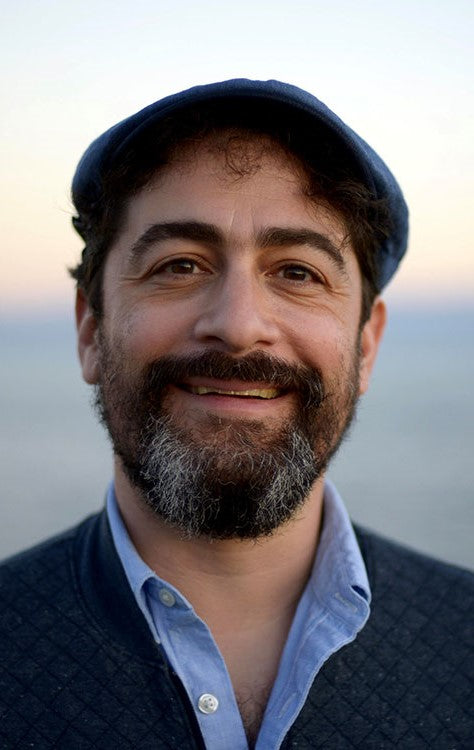An Interview with Daniel Maté | A Talk on Trauma, Toxic Culture, & His New York Times Best-Selling Book - The Myth of Normal

In this episode, we chat with Daniel Maté, an award-winning Musical Theatre songwriter, author, and educator. Daniel holds an MFA in Musical Theatre Writing from Tisch/NYU and a B.A. in Psychology and Philosophy from McGill University.
Daniel co-authored the New York Times bestselling book, The Myth of Normal, with his father, Dr. Gabor Maté. He also runs the world's only "Mental Chiropractic" service, Take a Walk with Daniel.
He received the prestigious Edward Kleban Prize for Most Promising Lyricist in American Musical Theatre, a Jonathan Larson Foundation Grant, and the ASCAP Foundation's Cole Porter Award for Excellence in Music and Lyrics (for his song cycle The Longing and the Short of It.) He has presented his work at the historic Kennedy Center in Washington, DC and New York's Lincoln Center and was an invited participant in the inaugural Johnny Mercer Writers Colony.
The Happiness Planner: Tell me about your background in mental health and wellness. How did you come about writing this book?
Daniel Maté: You could say I was born to it because I have a family that's always been interested in healing and growth. I have a father who made it his profession, increasingly so since I was a kid. I also had my personal reasons for being interested in wellness because it was a challenging, elusive thing for me. I was carrying my own wounds that I needed to learn about. The complicated thing about my father being my father is that there's a conflict of interest in applying his approach to me because what I'm trying to heal from involves him. So, while he's an expert to the world, I've had to find my own way.
Since early adulthood, I explored a lot of different modalities to try and understand myself, from being a singer-songwriter and writing songs about what was going on internally to therapy, meditation, and spirituality. None of them really worked for me. Then, in my late twenties, I encountered some more direct approaches that helped me see that what I took to be reality was just a conditioned set of assumptions, conclusions, beliefs, and interpretations that I had been trapped inside. Once I saw that, I had the possibility of transforming those things. Not overnight, not once and for all, but diligently, consciously, and with intention.
Secondly, psychedelics had a role. However, I have a complicated history with them, given that they were a big part of my marriage and that marriage was very related in ways that were too close for comfort to my father and his work. So, I've had to find my way into and out of that.
I'm not a mental health practitioner per se, I'm a musical theatre writer, but I've always been interested in people and in having conversations that make a difference. I do this thing you could say is a mental health modality that I call Mental Chiropractic. It's an outside-in approach, where I help people get unstuck from situations and ways of looking at things affecting their lives. When you loosen up and align the spine, the nerve is no longer pinched, and the muscle is no longer aching. The symptoms of the body ease up because alignment in the core organizing principle in the spine has been achieved. It's a similar thing with the mind. That's why I call it mental Chiropractic.

“What we take to be normal in this society is not actually natural, and in the context of human evolution, it's not even normal. It's aberrational. It's a new phenomenon. Also, because we assume that things have to be this way, we don't make the connections between how we live, our assumptions about health and wellness, our assumptions about human nature, and how our economic and political system is set up. We don't make the connections between those structures and the fact that health is deteriorating.”
I help people see where their intentions, thoughts, beliefs, interpretations, assumptions, prejudices, attitudes, and feelings are misaligned and how we can create alignment with the actual intention. When you do that, I find that it sends a message to the deeper parts of ourselves that "Hey, maybe things aren't set in stone." Just like I learned when I started doing my own work - and that's a really powerful insight that makes a profound difference.
The Happiness Planner: So, let's talk about the title of your book, and it's intended message.
Daniel Maté: I think it's trying to communicate that what we take to be normal in this society is not actually natural, and in the context of human evolution, it's not even normal. It's aberrational. It's a new phenomenon. Also, because we assume that things have to be this way, we don't make the connections between how we live, our assumptions about health and wellness, our assumptions about human nature, and how our economic and political system is set up. We don't make the connections between those structures and the fact that health is deteriorating - despite, in many countries, record wealth and comfort. As we start the book, it says, "In the most health-obsessed society of all time, all is not well," There's an irony in that. We're sort of irony-proof - we just explain it to ourselves, like, "Oh, it must be genetics, or it must be related to environmental toxins or some external reason." As a pose-to, our society makes people sick. That's quite a claim, so then we have to back it up – and we draw on a lot of science to do this.
Normal, by definition, is that which we don't notice. If you're walking down the street and you breathe in oxygen, and your body metabolizes it, and you breathe out carbon dioxide - you get home, and you successfully breathed a thousand times, that's not remarkable to you, you don't notice it. That's normal. That's how it's supposed to be. These days, breast cancer marathons are everywhere, and every single disease has some awareness drive. But if cancer is this external thing, this enemy we need to beat, as opposed to, maybe it's expressing something about people's lives. So that's one way that we normalize things.
We also normalize things by turning into virtues personality traits that cause people to be sick, such as self-sacrifice, self-abandoning, putting everyone else first, putting work before life, being dutiful, not expressing oneself, and not saying no when one needs to say no. Especially for women, these are taken to be normal, even desirable personality traits. Or, on the other side of the coin, being really strong and resilient. We have a story in the book about Hilary Clinton, who is much beloved by half of the American population and hated by the other half for exactly the same qualities - rigid, persistent, resilient and a kind of coldness. But what is that? It's the shutdown of vulnerability from a hurt child.

So now we get into the subtitle, which is just as important as the title. One thing that has been normalized and invisibilized in society is trauma, and one of the myths about trauma is that it's an abnormal thing that happens to some people who are very unfortunate. Rape, war, genocide, alcoholism, child abuse, you name it. But trauma doesn't just result from bad things happening but from good things not happening - and very few of us get out of childhood without encountering some of that.
Children need to be loved unconditionally, seen for who they are and have the freedom to experience and express their full range of emotions. How many families in this stressed, atomized society, where the village has been broken down, where corporations run everything, and where the economic system induces parents to be stressed and overworked, where relationships are strained because parents are carrying their own big traumas, where addiction runs ramped, where mental health runs ramped. What are the odds that a child will have parents who have the time and space? It's got nothing to do with loving the child. It has to do with the attention span and the emotional bandwidth to fully be there with and hold the child as they develop into who they're going to become. The odds in a society like ours that anyone will get a childhood that conforms with what human beings have evolved to need is slim to none - and there are impacts and consequences to that in our psyches and bodies. If you deprive any organism of what it needs to become itself fully, it will show mutations and distortions, or it will not thrive. As a species, we're very adaptable. We can normalize just about anything - but at a cost. We are just trying to name the cost and point out or connect the dots between the loss of connection to what human life requires, the loss of the sense of authentic self, the loss of connection to each other and to nature and the impact of these on our minds and bodies.
The Happiness Planner: What is missing from Western Medicine's approach to health?
Daniel Maté: Western medicine treats everything in isolation. It treats mind and body as if they're separate. It acts as if you can understand the brain without understanding the gut. That you can understand the immune system without understanding the emotional system. That you can understand pathology without understanding child development. Or that you can understand abnormal psychology without understanding what human needs are in the first place. By doing that, it artificially splits up a unified reality, where everything affects everything else and is connected to everything else.
But Western medicine has a way of believing in its own approach more than it's open to stepping back and seeing the connections between things.
The Happiness Planner: How does our culture impact our physical and mental health?
Daniel Maté: It's far too big a question because culture is so huge, and health is so huge - how do you even get your head around it? But what I could say is that, number one, human beings are social beings. We are affected by culture - whatever culture we are in, we are affected by the people around us. So, if it's a warm and loving environment, that will have one effect on our health. If it's a cold and scary environment, it will have another effect. Our biology is interpersonal - we just can't escape that. There are a million pop songs like "I get weak in the knees" - or "You take my breath away." We know that our bodies are affected by other people, and not just in the romantic or sexual context. For instance, a child's nervous system is conditioned by their parents' nervous system.
Number two, our health depends on becoming ourselves. If we don't become ourselves, our health will suffer. If a tree is prevented from growing in the way it's meant to grow in nature, by definition, it's going to become a diseased tree - it's going to malfunction. It might bend and find some adaptations, but it's not going to grow to reach its full potential. So, given that those things are true - if you want to ask how healthy the members of a culture are, then you have to ask, how well does that culture understand the nature of human beings and provide for the needs of that nature?
Our culture has certain assumptions about human beings - that they are individuals with minds and bodies separate from each other. That we are basically here on this earth to win - that's the capitalist assumption. To maximize our gains and minimize our losses. That life is competitive. We believe that babies need to learn to cry themselves to sleep instead of being picked up. We believe that a mother getting back to work is more important than getting three months of maternity leave. We believe that the economy is the most important thing, and our values tend away from the human and the humane towards the material and the competitive. So, what would you expect the effects of that to be on the bodies of the human members of that society? It would be very stressful because you're walking around in a state of tension, stress, competition, and disconnection.
The other way is that our particular culture induces people to adopt coping mechanisms that become their personalities and who they think they are, such as, "I'm a nice person who can't say no." Or, "I'm an aggressive person who has to win at all costs, and that's just the way I am." Well, no one was born unable to say no, and not being able to say no means not being able to set boundaries. If you can't set emotional boundaries, your immune system doesn't know to set boundaries often either. There's a connection between a lack of boundaries emotionally and the immune system, autoimmune issues, cancer and the like. So, the very qualities that our societies induce us to think are admirable and necessary are actually signs of trauma.
The Happiness Planner: What are some things we can begin doing today that will bring us closer to a state of wellness – closer to ourselves?
Daniel Maté: Given that the goal is authenticity and being in touch with yourself, number one is not believing that someone else's script will fit your own life. What I can point to, however, is the principles behind designing your own answer, which is asking, "What are the needs that I have not been meeting in my life - that I never learned to meet in my life as a kid? What needs did I learn to sacrifice and even deny that I had? Is it the need to feel all my emotions? Do I find it hard to feel my anger? Did my childhood trauma lead me to not be able to sit with myself? Am I disconnected from my stillness?" Then, maybe meditation might be a good thing. "Or is my mind constantly racing? am I disconnected from my body?" Maybe yoga. "Am I a rugged individualist who tries to do everything alone?" Well, maybe my practises should involve other people.
More info about Daniel:
View Daniel's Website: danielmate.com
View Mental Chiropractic: walkwithdaniel.com
Follow Daniel on Twitter: @danielbmate
Follow Daniel on IG: @danielbmate
Buy The Myth of Normal: Here

Explore our collection of Guided Journals

Download Happiness Planner mobile app to start journaling today



Comments